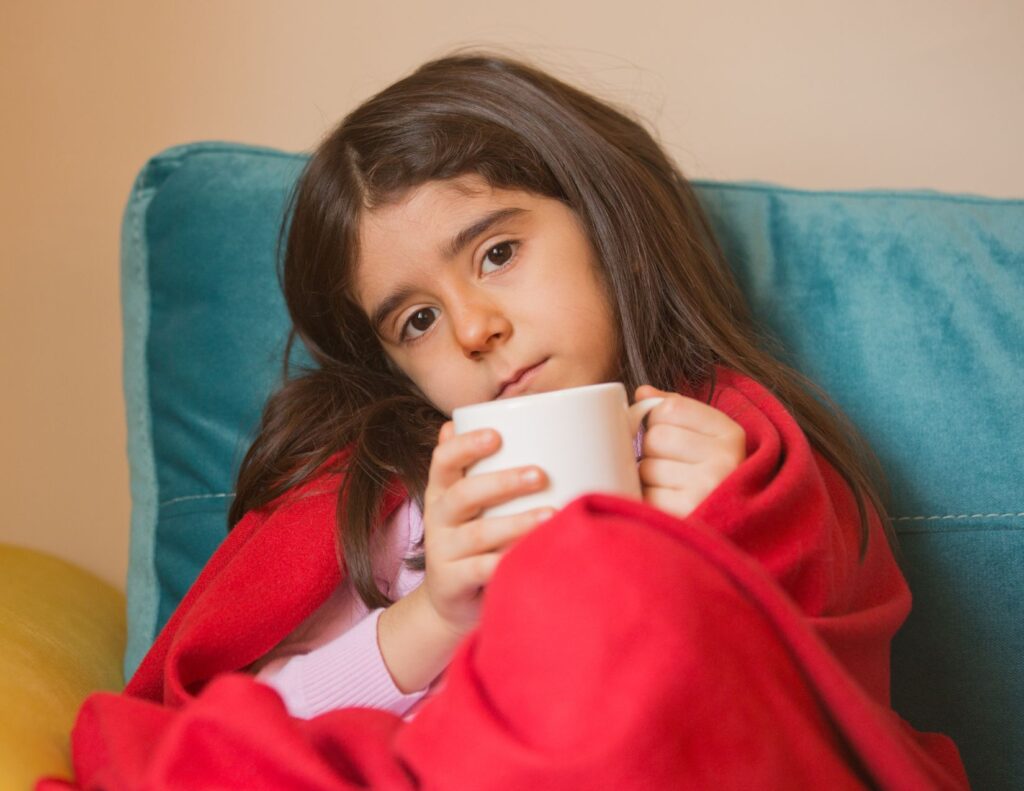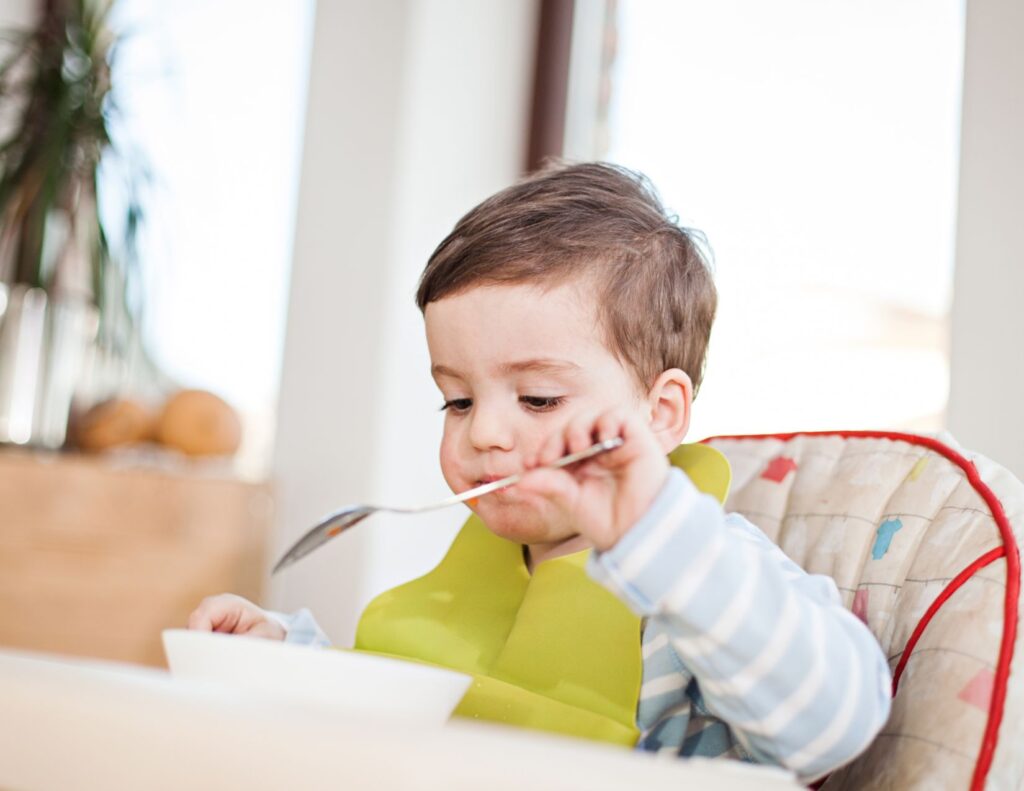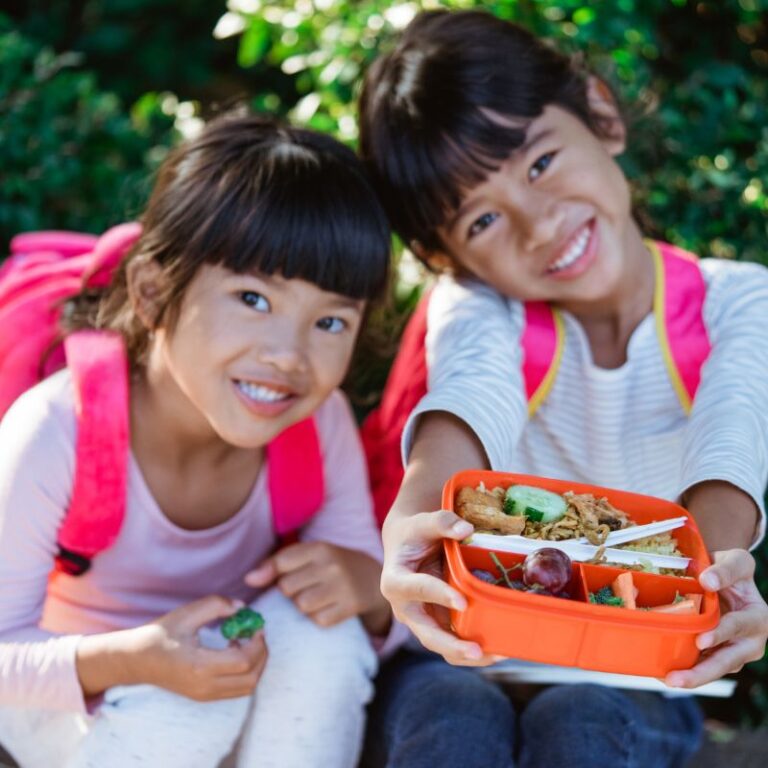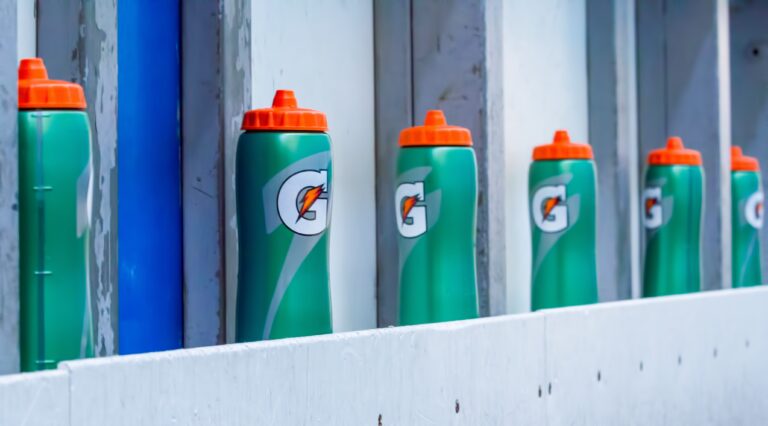If you’ve ever asked yourself “what can I feed my sick child?” keep reading for all the details!
Every fall and winter the “cough and cold” season revs up for kids. It’s that time of year when you ask yourself why you even pay for daycare when your child isn’t there half of the time!
Even more so this year, kids of all ages are getting hit extra hard by respiratory viruses in the first winter that many of us have had without mainstream pandemic precautions (e.g. masking, social distancing). The combination of getting hit at the same time (or sequentially) by the flu, COVID-19 and RSV (Respiratory Syncytial Virus) is being referred to as the “tripledemic or tridemic” and there’s been a massive first wave already. Let’s not forgot about all of the other bugs circulating out there too like Norwalk virus or “Winter Vomiting Disease” and the common cold with croup-like coughs and goopy runny noses. Throw in there a children’s medication shortage in Canada and you’ve got every parent’s worst nightmare!
Somewhere between the missed work days, sleepless nights, loads of laundry, and trying to make sure the illness doesn’t spread through your entire household, you’re asking yourself “what can I feed my sick child so that they’ll get better faster?!” Read on for all the details.
Note: This information does not replace medical advice. Contact your doctor if you’re worried about how your child eats or drinks when ill.
Before we talk about food, let’s talk about feeding!
If you haven’t heard me talk about the Division of Responsibility in Feeding before, it’s a feeding framework developed by Ellyn Satter that helps parents to raise a competent eater and a child who has a healthy relationship with food and their body. The framework separates a parent’s job in feeding, which is deciding what, when and where food is served, from a child’s job in eating, which is to decide if/how much they want to eat.
During a time of illness however, you need to be flexible and go with the flow a little bit more and let your child and their body dictate what seems reasonable, along with your wisdom and experience of caring for sick children. For example, when my daughter recently was sick with a sky high fever for days, I offered food and drink at regular mealtimes throughout the day but if she wanted to eat at 2:00 p.m. (not a normal meal or snack time) we did it!

Fluids First!
Whether your little one has the flu or they’ve got a bout of diarrhea or vomiting, hydration is of UTMOST importance! Your kiddo may not eat very much during a period of illness but as long as they are drinking adequately, they should be okay in the short-term.
Why is dehydration so bad for kids?
Dehydration occurs when the body loses fluids (a combination of water and salts). It happens quickly when kids have significant diarrhea and/or vomiting and are not replacing the lost body fluids with enough liquids by mouth. Dehydration is extremely serious and dangerous for babies and toddlers. If you are ever concerned that your child is dehydrated, seek medical advice.
Signs of dehydration.
A few signs of dehydration include:
- Reduced urine
- Increased thirst
- Absence of tears
- Dry skin, mouth and tongue
- Faster heartbeat than normal
- Sunken eyes and/or sunken soft spot on baby’s head
- Grayish skin
Keeping kids hydrated:
If you’ve got a babe at home, keep feeding them breastmilk or formula. Do not dilute either! It’s important to talk to your doctor or pediatrician about the safety of providing other fluids during times of illness. For children over the age of 1, here are some of my top fluid suggestions:
- Water or flavoured water
- Experiment with the temperature of water – your kiddo might prefer ice cold water or room temperature water
- You can try adding fresh fruit or even cucumber slices to flavour the water as well
- Herbal teas
- Chamomile and peppermint teas are great options
- Be sure to cool the tea down with some ice cubes after it has steeped long enough
- Honey lemon water
- Combine freshly squeezed lemon juice and honey with hot water and then add ice cubes to cool it down OR let cool at room temperate. (Quick reminder! Kids under the age of 1 cannot have honey due to the risk of botulism)
- Juice boxes
- Yes! Juice boxes! The risk of dehydration FAR outweighs and ‘cons’ of sugar or added sugar in a juice box. Buy a few packs to keep in your pantry so that you have a backup when illness strikes!
- However, if your kiddo has diarrhea, it can sometimes be advantageous to avoid sugary drinks and sweetened fruit juices. Without the correct combination of water, salt and sugar, these can make diarrhea worse. Check out the oral rehydration solution point below!
- Broths (homemade or store-bought)
- Broth, whether in a bowl of soup or heated as a drink, counts towards total fluid intake
- Homemade bone broth also has the benefit of protein and additional vitamins and minerals
- Frozen water or juice
- Ice chips, homemade ‘juice’ ice cubes, popsicles, freezies – these all count as fluids too!
- Smoothies
- If your child can tolerate some heavier textures, then a smoothie is a great way to boost nutrition along with fluids! Check out a few recipe ideas here.
If your child is dealing with diarrhea and/or vomiting, it might be helpful to try this:
- Oral rehydration solutions and sports drinks
- Oral rehydration solutions (ORS) contain a mixture of water, salts and sugar in very specific amounts so that your child’s body can absorb them even when they are having significant diarrhea or vomiting.The sugar in these drinks is helpful because it helps to get the electrolytes through the bloodstream to rehydrate your kiddo faster. Any sugar-free version of an electrolyte drink is NOT going to be helpful!
- The Canadian Pediatric Society has clear guidelines on how to use ORS. There are commercial brands available in pharmacies (e.g. Pedialyte). These recipes from Dartmouth Health are great options too!
And don’t forget that some foods have quite a bit of fluids in them! If your sick kiddo doesn’t have the stomach flu, they may be up to trying some juicy or watery fruits including watermelon, peaches, mango, oranges, kiwi, strawberries and cucumbers.

The best foods to feed sick kids
If you’ve ever been sick, you likely know the feeling of not being interested in (or hungry for) food. Kids feel the same way too! So, although it’s a bit scary, you will likely notice your child eating a lot less than normal (or not much at all). And yes, their weight may drop too! Typically, once kids are feeling better though, they will eat more and their weight will rebound accordingly.
For kids with diarrhea and/or vomiting
- Prioritize liquids to prevent dehydration
- When ready, move forward with smaller more frequent meals if needed
- Try a variety of foods in your child’s typical diet including complex carbohydrates (rice, wheat, potatoes, bread, oatmeal) lean meats, dairy products, fruits and vegetables
- It’s best to avoid high fat foods or foods with lots of sugar as they could aggravate nausea and/or diarrhea
Wait! But shouldn’t you follow the BRAT diet?
The BRAT diet, a diet consisting of 4 foods (bananas, rice, applesauce, toast) has been touted for years as essential in the recovery of a gastro bug. Unfortunately, there is simply no evidence to support the use of the diet. It is overly restrictive and provides few nutrients for the body to be able to heal. Here’s your permission to feed your child a balanced, nutrient-rich diet of foods they are interested in eating. There is no need to stick to saltine crackers for days!
Feeding solids to kids with flu or fever (NO diarrhea or vomiting):
Continue to offer the regular food/meals you normally would at regular times but trust their hunger and fullness cues. Do not force or pressure them to eat. Be flexible and if they want food outside of a set mealtime, let them eat when they have the interest. The same is true for babies too! Put them in their high chair and pull them up to the table, if they are well enough, and continue to offer solids as you normally would but trust their cues.
Will eliminating dairy reduce mucous production and get rid of the snotty nose faster?
Long story short, there is no need to avoid milk or dairy products if your child eats them. There have been many studies that have looked at the relationship between drinking milk and how it affects mucous production but there is no evidence to suggest that there is any relationship. In fact, milk can even help with hydration.
What about foods or fluids to help those nasty nighttime coughs?
Due to the fact that many cough suppressant medications are not approved for use in young children, it’s hard to know what to do to help your hacking kiddo at home, especially for those night time coughing fits. Some evidence suggests that a spoonful of honey may be better than no treatment. While the evidence isn’t all that strong, there’s no harm in trying this for kids over the age of one.
Caring for sick kids is hard! Be sure to reach out for help and call on your support network for meals or runs to the pharmacy when needed! I hope this article helped to answer your question “What can I feed my sick child?”. For more support feeding kids, be sure to check out our 1:1 services.







